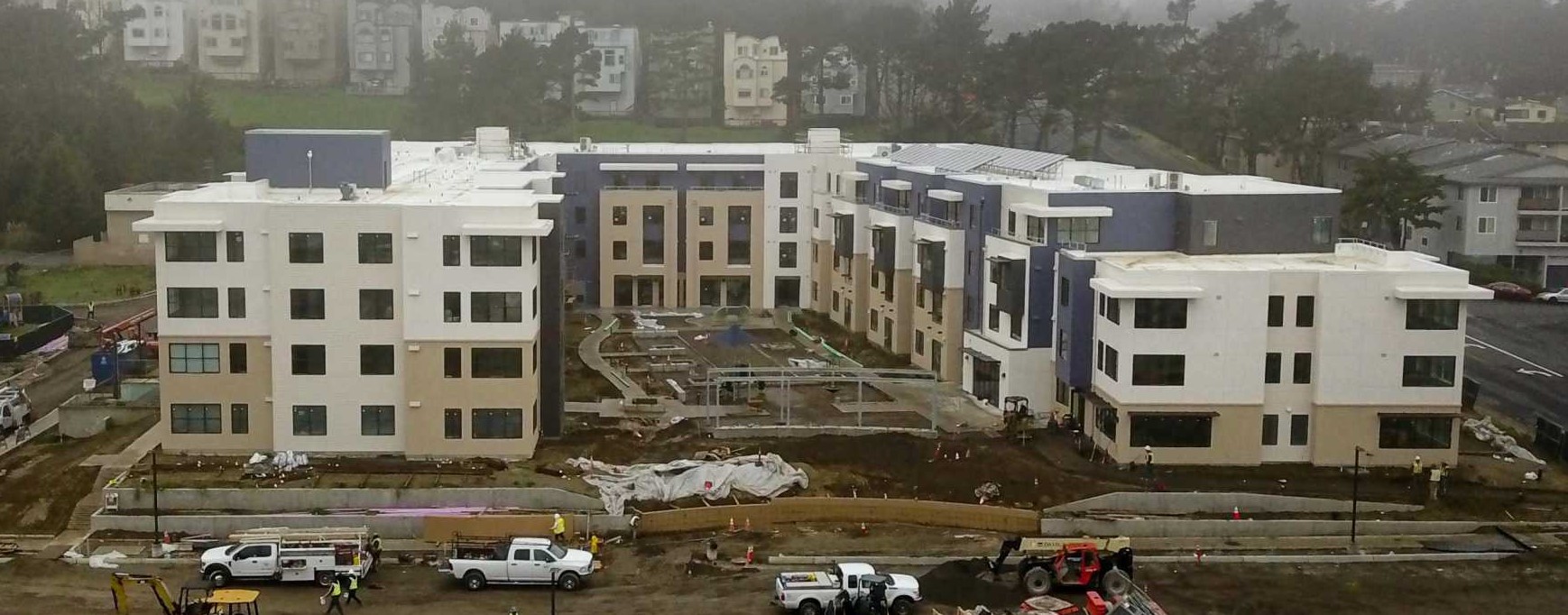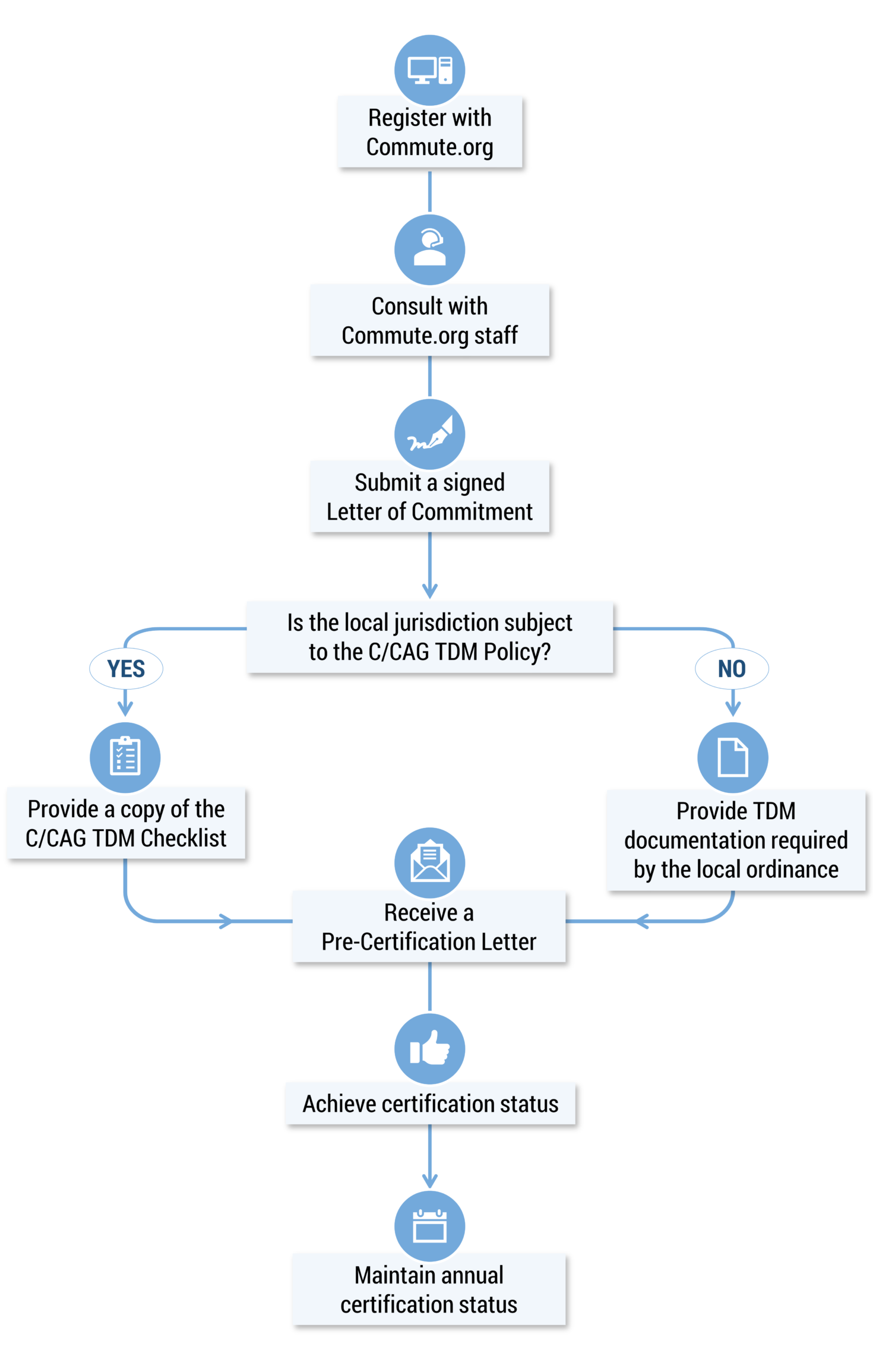A program designed to assist developers in San Mateo County with their TDM requirements
The Certified Development Program is designed to provide developers with projects in San Mateo County with a formal certification of their active participation in Commute.org programs and services. Active participation may be a requirement for developments that are subject to the C/CAG Countywide TDM Policy and may also be a TDM requirement imposed on developers by jurisdictions that are not subject to the C/CAG policy. The goal of the program is to provide developers access to a set of TDM programs and services that can be integrated into the other tools they will use to reduce VMT and trip counts to new commercial, residential, or mixed-use developments in San Mateo County.

A development project can earn certification in the Commute.org Certified Development Program by successfully completing the process described below. The developer must apply for and receive Pre-Certification during the pre-construction phase and then, upon completion of the development, comply with the remaining steps to achieve full Certification.
Any development project subject to the C/CAG Countywide TDM Policy may be required to receive and retain Certified Development Program status. Projects in jurisdictions that are exempt from the C/CAG policy, may or may not be required to have the certification. The VMT mitigation and TDM programming agreements between the developers and the exempt jurisdictions can, but are not required to, include the Certified Development Program requirement.
Commute.org’s TDM Policy team will provide guidance and support to developers throughout the process. An online platform will be used to track compliance and record completed documentation.
Each development project that needs or wants to be certified must complete the following steps:

Development projects will be considered active participants with Commute.org if they comply with the requirements below. Commute.org will track active participation on an ongoing basis through our online monitoring platform and provide appropriate jurisdictions with annual updates regarding active participation. Participating jurisdictions will also have access to the platform for ongoing monitoring and reporting purposes.

Certified Development Program is designed to provide developers with projects in San Mateo County with a formal certification of their active participation in Commute.org programs and services. Active participation may be a requirement for developments that are subject to the C/CAG Countywide TDM Policy and may also be a TDM requirement imposed on developers by jurisdictions that are not subject to the C/CAG policy. The goal of the program is to provide developers access to a set of TDM programs and services that can be integrated into the other tools they will use to reduce VMT and trip counts to new commercial, residential, or mixed-use developments in San Mateo County.
The C/CAG Land Use Impact Analysis Program Policy – also known as the “TDM Policy” – is a component of the San Mateo Congestion Management Program (CMP). The TDM Policy provides guidelines for analyzing the impact of land use decisions made by local municipalities in San Mateo County. The purpose of the policy is to preserve acceptable performance on the countywide CMP network, and to establish community standards for consistent, system-wide review of development-related transportation impacts.
As of January 1, 2022, the C/CAG TDM Policy requires local jurisdictions in San Mateo County to:
All C/CAG member jurisdictions must comply unless expressly exempt by C/CAG due to local requirements meeting or exceeding the trip reduction targets set by the Policy.
Any development project subject to the C/CAG TDM Policy may be required to receive and retain Certified Development Program status. Projects in jurisdictions that are exempt from the C/CAG policy, may or may not be required to have the certification. The VMT mitigation and TDM programming agreements between the developers and the exempt jurisdictions can, but are not required to, include the Certified Development Program requirement.
All jurisdictions in San Mateo County are subject to the TDM Policy – unless expressly exempted by C/CAG. To determine if your development is located in an exempt jurisdiction, please contact the TDM Policy team here.
The C/CAG TDM Checklists are available here and vary by the land use and estimated Average Daily Trips (ADT) of the development. Developments that are subject to the C/CAG TDM Policy must provide a copy of the TDM Checklist to Commute.org as part of the certification process.
Please refer to your local jurisdiction contact to determine what materials are needed to comply with the local TDM ordinance. You will need to submit copies of this documentation to Commute.org as part of the certification process.
Development projects will be certified as active participants with Commute.org if they follow the Certification Process and comply with the Requirements for Active Participation.
No, developers are responsible for complying with the TDM plans that are part of the development’s approval. A plan may include programs and services provided by Commute.org, but the responsibility for managing the TDM plan and being compliant with the conditions imposed by the local jurisdiction lie with the developer.
Please contact the TDM Policy team by clicking here. A member of our team will reach out to schedule your consultation and project training.